The Catholic Church is not the only institution that should be protecting victims of child sexual abuse | Editorial
One institution, the Catholic Church, has failed these children. Two other powerful institutions — Pennsylvania's Supreme Court and its legislature – shouldn't fail them, too.

In just four weeks since its release, Pennsylvania's gut-wrenching grand jury report on widespread child sexual abuse by Catholic priests has reverberated around the country with attorneys general in 10 states announcing investigations of their own. It has even reached the Vatican, where the pope has called for a summit of Catholic leaders to rethink their complicity in vile acts against the innocent.
But will anything be done to help the victims here in Pennsylvania?
Later this month, two powerful institutions have a chance to help them.
On Sept. 26, the Pennsylvania Supreme Court will hear arguments on naming all of the priests accused of abusing children. About two dozen had their names redacted from the grand jury report, arguing that they deserved due process and wanted to rebut its findings. They already can do that, but now they're attacking the state's tough grand jury law. The court should protect the law, especially elements that allow prosecutors to use grand juries to conduct sweeping investigations like this one and make strong policy recommendations.
On Sept. 24, the legislature is set to return to Harrisburg, and it should quickly pass bills that make it easier for district attorneys to prosecute predators and for victims to sue their abusers as well as the institutions that enable wrongdoing.
The House seems ready to open a two-year civil window so victims can sue their abusers and the institutions that cover for them. Current law only allows victims to file civil suits for 12 years after they turn 18. Once they reach 30, they're out of luck; that's wrong. This is one of four recommendations from the grand jury that the legislature should heed.
The Senate, where similar initiatives to uncap the statutes of limitations have failed, has been resistant to fixing the laws. Senate President Pro Tempore Joseph Scarnati (R., Elk) should not listen to powerful forces telling him to turn his back on those deeply wounded by child sexual abuse.
Others are paying attention to the victims. With 10 states launching investigations and 20 more contemplating probes, it is likely that the Pennsylvania story will be told over and over again. In fact, since the report's release, over 1,000 more victims have called Attorney General Josh Shapiro's abuse hotline. Those calls have come from around the country, underscoring the fact that because abusive priests were transferred to other states, their destructive acts were not contained by geographic boundaries.
In fact, because this is a national issue, the Justice Department should consider stepping in. At the very least, it could make sure the church's secret archives, which contain detailed documents of the abuse and the cover-ups, are preserved.
One institution, the Catholic Church, has failed these children. Others, including Pennsylvania's legislature, should not.
In a meeting of the Editorial Board on Friday, Shapiro said: "I don't know how any responsible lawmaker in Pennsylvania could read this report and not vote for these reforms."
Neither do we.